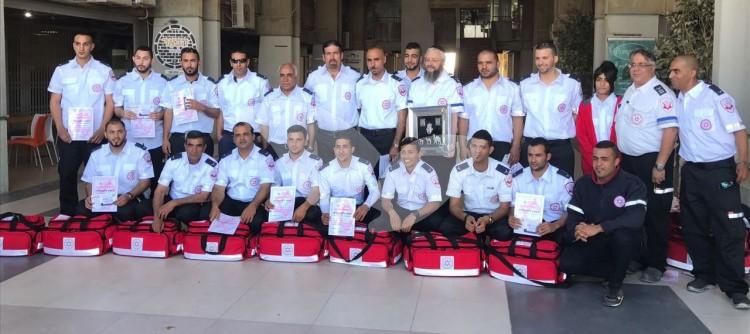MDA Welcomes Largest Class of Bedouin Paramedics
Jerusalem, 6 April, 2017 (TPS) -- A total of 24 Bedouin volunteers, including 23 men and one woman ranging in age from 19 to 61, completed Magen David Adom’s (MDA) Emergency Medical Technician (EMT) training course this week. The group was the largest from the Bedouin sector to complete the course.
The newly-minted EMTs received diplomas, uniforms, first-responder kits, and pagers as well as the MDA mobile phone app that allows them to receive emergency calls. They will join dozens of Bedouin volunteers who have already been trained by MDA, many of whom are just in their teens. In addition, some of the students are also training to become MDA ambulance drivers.
The students completed 200 hours of training as part of an extensive collaboration effort between Magen David Adom and the Authority for the Development and Settlement of the Bedouin in the Negev to improve emergency medicine for the Bedouin community. The course was the first to be designed specifically for the community and to be composed only of local trainees.
“These graduates are an example of Israel’s beautiful people and are a personal example for the Bedouin community and the State of Israel,”said Agriculture and Rural Development Minister Uri Ariel. “As the minister responsible for the Bedouin community, I am proud to be a part of this and to see all the volunteers working to contribute to society and to save lives. We will continue to work to incorporate the Bedouin into every aspect of the Israeli community,”
According to the Association for Civil Rights in Israel (ACRI), the Bedouin population is the poorest and weakest of any group in Israel. The standard of living in the community, and particularly among those residing in unrecognized villages, is considerably lower than the average standard of living in either Jewish or other Arab localities in Israel.
The majority of Bedouin communities lack basic welfare, educational, and health services, which demand particularly serious attention considering the high rate of birth.
“Calls to MDA from the Bedouin diaspora (unrecognized communities in the Negev Desert – I.M.) are not usually accompanied by a specific location because homes are very scattered and you cannot usually find them by using a street number or roads,” MDA spokesperson Lia Averbuch told Tazpit Press Service (TPS).
“The volunteers from the Bedouin diaspora are able to get to the people in need faster because they have a more intimate acquaintance with the terrain and the local families. Moreover, they help provide insight to dispatch ambulances coming from outside and to accompany them to the location they need to reach,” Averbuch explained.
Averbuch added that serving as part of MDA will also help integrate the Bedouin community into Israeli society. Haredi instructor Moshe Rosenfeld also found the experience of teaching the course to be particularly interesting because he realized how much the Bedouin and the Haredi populations have in common.
MDA Director-General Eli Bin stated that MDA works relentlessly to involve every segment of the Israeli population.
“The EMT courses in the Bedouin diaspora are another step on the path towards strengthening the cooperation with the Bedouin community and towards creating a community with a functioning emergency medicine service,” said Bin.
“I am proud of the volunteers who dedicated their time towards the development of the community and I am certain that we are already on the path towards optimizing medical response,” he concluded.


